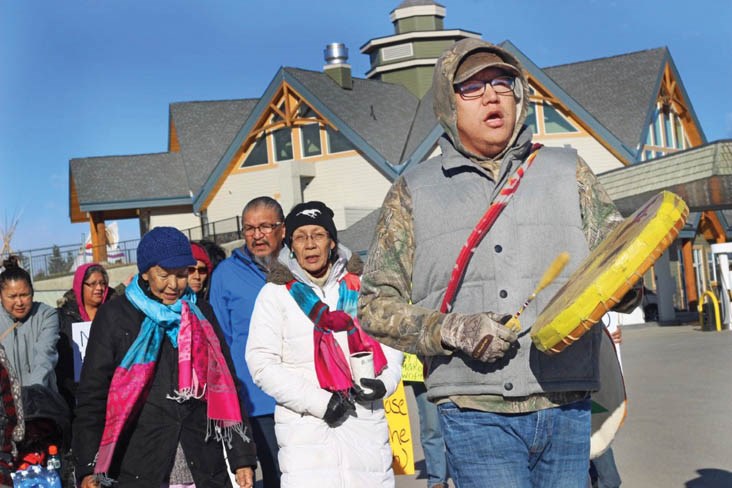STONEY NAKODA – Dozens of residents from Stoney Nakoda First Nation braved cold weather and strong winds Friday (Oct. 12) to protest against a land referendum being held on Oct. 18.
The protesters marched along Morley Road from the Chiniki Gas Bar to the Stoney Nakoda First Nation Administration building to get their message across.
The modest-sized group, brandishing signs reading “Vote No,” and “Take care of Mother Earth,” are on one side of a divisive and persistent debate within the Nation – whether to “modernize” and develop the land or to keep the lands as they traditionally were.
“I’m proud of you my Yethka (Stoney or mountain people) brothers and sisters,” said Eli Snow, who co-led the group on the march.
“At the end of the day, when you go to see that last camp, when you go to see Wakâ (spiritual world) and all of our ancestors, they’ll be proud of you because you can stand there, you can say, ‘I walked. I tried to help. I said no.”
The designation could potentially see about 3,000 hectares of reserve land commercialized.
Stoney Nakoda chief and council have promised business opportunities, jobs and prosperity for the Nation, which currently depends on its declining oil and gas royalties.
“It’s just forward thinking,” said Chiniki councillor and spokesperson Jordie Mark in an earlier interview with The Cochrane Eagle.
Mark has mentioned a number of times that he worries some Nation members don’t know enough about what the land designation means for the community and implored those needing information to reach out with questions.
Chief and council first brought the vote to designate the Treaty Seven land in February 2018, but it was voted down by residents with 654 voting no and 558 voting yes.
The property up for designation sits on seven sections of land throughout the Nation’s three reserves (Eden Valley, Big Horn and Morley) and represents seven per cent of the reserve lands owned by the Nation.
The locations are within the Morley townsite and surrounding the Chiniki Cultural Centre, Nakoda Lodge, Morley west end, Morley east end, Eden Valley farm lands, and Big Horn gas bar.
Residents at the time of the first vote expressed concerns over the enormity of the land parcels – they said they’d rather have several votes for each section of land rather than having all the parcels bundled into one decision.
If the land designation vote is approved, Mark said Chiniki will follow through with its solar project in partnership with Trico Homes, which is expected to generate 40 mega watts of energy.
A yes vote would also open the land to any business that is owned by a Nation or non-Nation member, though the land will still be managed by Stoney Nakoda.
The land must be designated in order to be developed for commercial use under the Indian Act and the Nation leadership stressed that the designated lands would keep its reserve status.
But that’s the part – having non-Nation owned businesses setting up shop on the reserve – that seems to raise red flags for some community members.
Bree Hunter, a 20-year-old Stoney member who participated in the protest, said a no vote isn’t about resisting the development of her community, but resisting having the outside world forcing development upon the community.
“We have lost so many ancestors fighting over how the land should be taken care of,” Hunter said. “Our ancestors believed it didn’t belong to anyone. It shouldn’t be leased or sold.”
“If the vote goes through and they bring in the designation, that, in my opinion, is a form of assimilation,” she said. “To assimilate, it’s basically people letting go of what we were taught, I feel. If we want businesses or jobs on the reserve – we’re getting there. More people are graduating each year. If they want more jobs they just have to wait, we can do it on our own eventually. We just have to take the time to do it, be patient.”
Hunter, along with several others the Cochrane Eagle spoke with, referenced several sections of reserve land that were designated for businesses but have since closed.
These included the Nakoda on the Lake lodge, which quietly shut its doors a few years ago and the former hamlet of Seebe – a former employee townsite for Calgary Power Company Ltd., which in 2004.
“Why do they want to designate more lands – like 3,000 hectares – to start businesses, which they could have started over here to show people they can put up businesses and start generating revenue for that?” said Stoney elder Sheila Holloway.
“It’s not fair to the people,” she said.
Sheila’s nine-year-old granddaughter, Chanel Holloway, missed the morning of school to participate in the march.
The Grade 4 Canmore student said she worries there will be no traditional land left for her generation and future generations if the land continues to be designated for businesses.
“I was thinking about what if people realize that the land shouldn’t be for sale? It’s for the young ones when their parents aren’t going to be here,” Chanel said.
“We had a vote in February, majority was no,” said another protester, Terry Rider.
“Why are we doing this? Simple as that. This land is not for sale.”
Margaret Rider, Bree Hunter’s grandmother, participated in the protest despite being unable to physically walk the entire distance.
“It means everything to me, you know, the land is so precious,” she said. “We already said no at the February vote and we’re going into it again. I think in our custom and tradition, no means no.”
Voting begins at 9 a.m. and closes at 8 p.m. Polling station information can be accessed at stoneynation.com.




